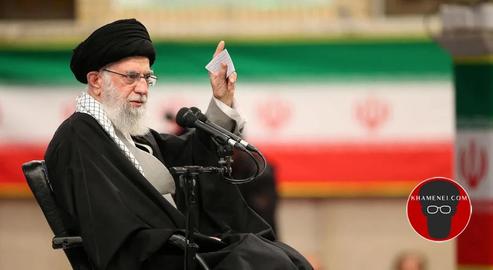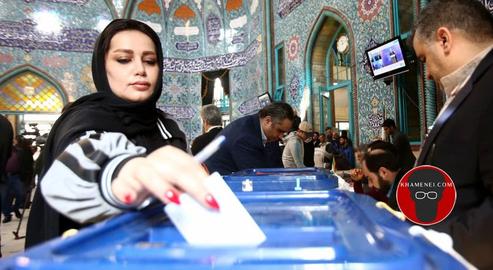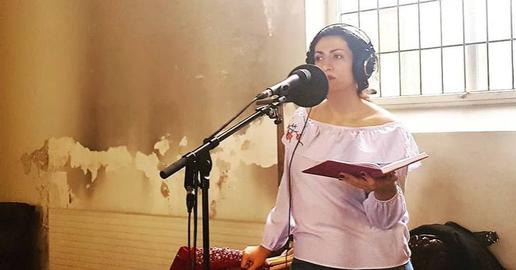In 48 hours, the show would be over. The director glanced at the table he had set out on the stage and murmured his satisfaction. So far, the performance had progressed as planned, the actors were reciting the script without improvisation, and the audience in the half-empty house were applauding.
Outside the theatre, though, a wandering crowd was making a racket. Everybody, inside and out, knew that in two days’ time a new story would replace this one. What had been less expected was the King's voracity for filling the theater to the brim.
Today some Iranians are voting in the 13th presidential election under the Islamic Republic. The gulf between those who sincerely want to vote and those boycotting has never been wider; this time, even some of Iran’s reformists have turned their backs on the ballot box.
But Khamenei’s televised speech on Wednesday tried to promote a different message. The King announced: “Participate in the election, or we’ll make you participate!”
***
On Wednesday, June 16, in his final speech before the election, Khamenei dedicated much of his 30-minute address to the issue of turnout. Voting, he said, bolstered the legitimacy of the Islamic Republic, ensured the integrity of the election and, of course, anybody against voting was an “enemy”.
“Enemy” is one of Khamenei’s favorite words. Boycotters, he believes, are patsies for Iran’s foreign so-called adversaries. Using every tool at his disposal, chief among them the media, he has long tried to bully the unconvinced into registering their approval of the system.
This time around, Khamenei emphasized that such “enemies” were not only against “faith” and “Islam”, but also against Iran. After repeating the word “enemy” over and over, he then emphasized the political and military might of the Islamic Republic and the integrity of all elections during its lifetime.
Early in his speech Khamenei said “the enemy’s” goal was that the election would not take place the way the Islamic Republic wanted. The goal of the “satanic powers”, he proclaimed, was to separate the people from the Islamic Republic.
“For the past few months,” Khamenei said, “American and British media have been trying very hard to decrease the people’s presence at the ballot box. Of course, experience has shown that the people have done the opposite of what the enemy wanted. This will be the case this time too.” People’s participation, he claimed, meant ensuring the “reputation” of the Islamic Republic.
“Elections are a sign of the people’s presence,” he added. “The people’s presence means that the Islamic Republic is supported by the people. This will have an exceptional impact on the strength of the system and the country. I mean to say that no other method brings as much strength as the people’s presence... Those who are discouraging the people from participating are working to weaken the Islamic government, in order to turn the country into a parade ground for terrorists.”
He did concede that the poor people of Iran had complaints. But nevertheless he said, the decision not to vote was the wrong one. The Leader’s repeated emphasis on the absolute necessity of a high turnout has now given rise to a suspicion: are they going to stuff ballot boxes if turnout is too low? Or simply disregard the absence of huge swathes of the Iranian population?
Have Paper Ballots Ready
The last part of Khamenei’s speech might have answered this question. Organizers of today’s vote, he advised, “should eliminate the problem of a shortage of paper ballots in elections, as has been experienced in previous ones. They should distribute paper ballots across polling stations on time so that no center will face a shortage of these papers.”
In a Clubhouse chatroom, political activist Taghi Rahmani later addressed the matter of paper ballots: “Khamenei is a great actor but he does not act in the interests of the people. His speech gave me a bad feeling.
“Sometimes Khamenei uses code words in his speeches. When he said they should take care of paper ballots, shivers ran through me. Is this what they have in store? Since [the Constitutional Revolution of 1905] the practice of stuffing ballot boxes has been prevalent. Khamenei’s calm demeanor showed that he was confident about which government is going to take over.”
Azar Mansouri, a spokesman for the Reformist Front Coordination Council, said in the same chatroom that Khamenei’s speech had put forward nothing new, expect that he was demanding a high turnout.
Other activists noticed the same. Faraj Sarkoohi, journalist and a member of the Iranian Writers Association, said he believed the significant point was Khamenei’s insistence that people prove there was no division between them and the government.
“Low turnout means that the people are distancing themselves from the regime,” he said. “To vote means going along with the regime while those who do not vote are going a separate way.”
“Counterfeit” Elections
So far, political activists and analysists generally agree that Ebrahim Raisi, the head of Iran’s judiciary, will emerge as the “people’s choice”. But the political activist Mehdi Mahmoudian takes a different view.
Mahmoudian believes that the election in Iran is a “counterfeit” and in fact, it would benefit the “deep state” within the Islamic Republic if a reformist won. “The rulers’ representative should not become the ruler, so that they can do what they want,” he explained. “If I were the writer of this play, I would do a conjuring trick and draw the name of [reformist candidate] Abdolnasser Hemmati out from the ballot box.”
After President Khatami’s second term in 2005, Mahmoudian asserted, the policy of the Islamic Republic had been to “counterfeit” anything and everything, from institutions and associations to organizations and movements. This “counterfeit election”, he said, follows the same pattern.
The sociologist Hossein Ghazian, meanwhile, posed a question: would political actors be able to take advantage of the low turnout? “Would it be possible for political forces to maximize the adversarial relations between voters and boycotters and, if the turnout is low, use it as a capital – to put more distance between them and the Islamic Republic, and prepare for other actions in the future?”
What about the Day after the Election?
The next president of Iran is likely to be named later today. If Raisi wins, the government of the Islamic Republic will be controlled by hardliners from top to bottom. But there are others who believe this is still not a done deal.
The reformist camp, meanwhile, has been riven by internal divisions. Mir Hossein Moussavi, who stood against Ahmadinejad in the disputed 2009 election and is still under house arrest, has called for a boycott – while former president Monhammad Khatami has said that people must vote and, if turnout is high, it could make a real difference.
There are also many observers, like Faraj Sarkoohi, who believe that no matter what the outcome is, those who would see the Iranian political system changed from within are going to be the losers. “Even if Hemmati emerges victorious, he’ll continue Rouhani’s policies and the consequences will be worse for the reformists. If he doesn’t, they’ll lose the last of their authority.”
The curtains are still up, and the show is still in progress. The director, playing the King and smirking all the while, is watching the actors as they follow his scenario line by line. However it ends, it will give way instantaneously to another farce, from which he can again withdraw, drunk on the ghosts of applause.
Related Coverage:
A Week With Khamenei: Women in the Presidential Election
“Wife” and “Mother” Is What a Muslim Woman Must Aspire to
Firebrands, 'Rentals' and Has-Beens on Reformists' 2021 Candidate List
Ebrahim Raisi’s Presidential Candidacy: A Gamble on Succeeding Khamenei
IranWire Exclusive: Chief Justice Using Fabricated Supporters in Presidential Bid
Has the Regime Decided Low Election Turnout is its New Strategy?
visit the accountability section
In this section of Iran Wire, you can contact the officials and launch your campaign for various problems



























comments